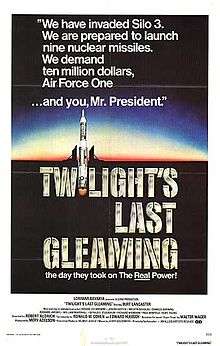Twilight's Last Gleaming
| Twilight's Last Gleaming | |
|---|---|
 | |
| Directed by | Robert Aldrich |
| Produced by | Merv Adelson |
| Written by |
Ronald M. Cohen and Edward Huebsch (screenplay) Walter Wager (novel) |
| Starring |
Burt Lancaster Richard Widmark Charles Durning Paul Winfield William Smith |
| Music by | Jerry Goldsmith |
| Cinematography | Robert B. Hauser |
| Edited by |
Michael Luciano William Martin Maury Winetrobe |
Production company | |
| Distributed by | Allied Artists |
Release dates |
|
Running time | 146 min |
| Country |
United States West Germany |
| Language | English |
| Budget | $6.2 million[1] |
| Box office | $4.5 million[2] |
Twilight's Last Gleaming is a 1977 film directed by Robert Aldrich and starring Burt Lancaster and Richard Widmark. The film was a West German/US co-production, shot mainly at the Bavaria studios.
Loosely based on a 1971 novel, Viper Three by Walter Wager, it tells the story of Lawrence Dell, a renegade USAF general, who escapes from a military prison and takes over an ICBM silo near Montana, threatening to launch the missiles and start World War III unless the President reveals a top secret document to the American people about the Vietnam War.
A split screen technique is used at several points in the movie to give the audience insight into the simultaneously occurring strands of the storyline. The film's title, which functions on several levels, is taken from The Star-Spangled Banner, the national anthem of the United States of America:
- O say, can you see, by the dawn's early light / what so proudly we hailed at the twilight's last gleaming.
Plot
After escaping from a military prison, the rogue Air Force General Lawrence Dell (Burt Lancaster) and accomplices Powell (Paul Winfield), Garvas (Burt Young), and Hoxey (William Smith) infiltrate a Montana ICBM complex that Dell helped design. Their goal is to gain launch control over its nine Titan nuclear missiles. The infiltration does not go as planned, as the impulsive Hoxey guns down an Air Force guard for trying to answer a ringing phone. Dell then shoots and kills Hoxey. The three then make direct contact with the US government (avoiding any media attention) and make their demands: $10 million ransom, and that the President (Charles Durning) go on national television and make public the contents of a top-secret document.
The document, which is unknown to the current president but not to certain members of his cabinet, contains conclusive proof that the US government knew there was no realistic hope of winning the Vietnam War but continued fighting it for the sole purpose of demonstrating to the Soviet Union their unwavering commitment to defeating communism.
Meanwhile, Dell and his two remaining men remove the security countermeasures to the launch control system and gain full launch capability over the complex.
While the President and his Cabinet debate the practical, personal, and ethical aspects of agreeing to these demands, they also authorize the military to send an elite team led by General MacKenzie (Richard Widmark) to penetrate the ICBM complex and incinerate its command center with a low-yield tactical nuclear device. Just as the device is about to be set, the commando team accidentally trips an alarm, alerting Dell to their operation. The furious Dell responds by initiating the launch sequence for all nine missiles. As the military and President Stevens watch the underground missile silo launch covers begin to open, they agree to call off the attempt and the launch is aborted with mere seconds to spare. During this time, the captive Air Force guards attempt to overpower Dell and his men, resulting in the death of Garvas and another guard.
Eventually, the President agrees to meet the demands, which include allowing himself to be taken hostage and used as a human shield while Dell Powell make their escape from the complex. As the president leaves the White House, he asks the Secretary of Defense to release the document should he be killed in the process. US Air Force snipers take aim and shoot both Dell and Powell, but also accidentally shoot the President, who with his dying breath asks the Secretary of Defense if he will release the document. The Secretary cannot bring himself to answer.
Cast
- Burt Lancaster as Gen. Lawrence Dell
- Paul Winfield as Willis Powell
- Burt Young as Augie Garvas
- Richard Widmark as Gen. Martin MacKenzie
- Charles Durning as President Stevens
- Joseph Cotten as Secretary of State Renfrew
- Melvyn Douglas as Secretary of Defense Guthrie
- Richard Jaeckel as Capt. Towne
- William Marshall as Attorney General Klinger
- Roscoe Lee Browne as James Forrest
- Leif Erickson as Ralph Whittaker
- Gerald S. O'Loughlin as Brig. Gen. O'Rourke
- William Smith as Hoxey
- John Ratzenberger as Sgt. Kopecki
Distribution
The film did poorly at the box office.
In France it recorded admissions of 88,945.[3]
It was unsuited for videocassettes, because the split-screen effects do not work well in low resolution of that format. After the rights reverted to the film’s German co-producers, a major remastering effort was done by Bavaria Media, who released a Blu-ray edition, distributed in the United States by Olive Films in 2012.[4]
See also
- Seven Days in May, also starring Burt Lancaster as a renegade member of the U.S. military attempting to stage a coup
References
- ↑ Alain Silver and James Ursini, Whatever Happened to Robert Aldrich?, Limelight, 1995 p 300
- ↑ Alain Silver and James Ursini, Whatever Happened to Robert Aldrich?, Limelight, 1995 p 42
- ↑ French box office results for Robert Aldrich films at Box Office Story
- ↑ David Kehr (November 25, 2012). "Nuclear Missiles and Cold War Cupid's Arrows". New York Times.